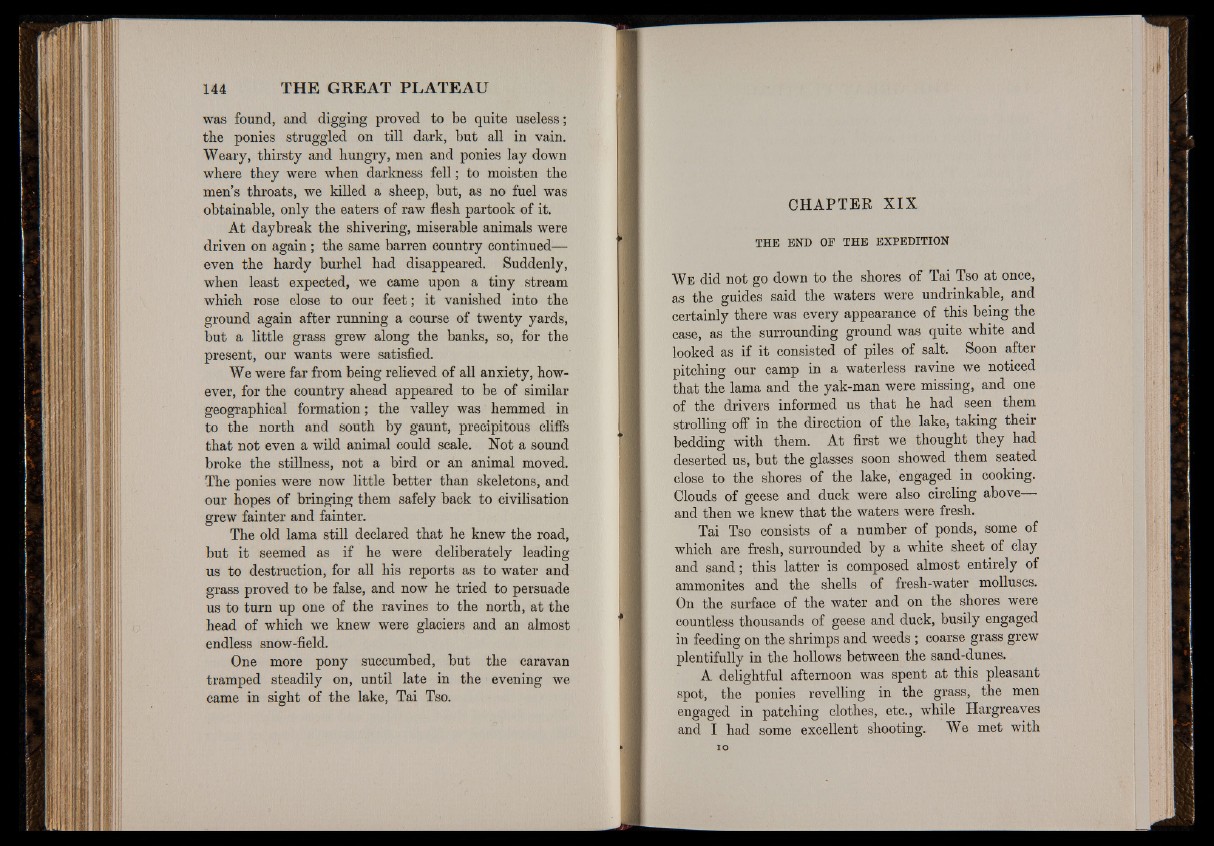
was found, and digging proved to be quite useless ;
the ponies struggled on till dark, but all in vain.
Weary, thirsty and hungry, men and ponies lay down
where they were when darkness fell; to moisten the
men’s throats, we killed a sheep, but, as no fuel was
obtainable, only the eaters of raw flesh partook of it.
At daybreak the shivering, miserable animals were
driven on again; the same barren country continued—
even the hardy burhel had disappeared. Suddenly,
when least expected, we came upon a tiny stream
which rose close to our feet; it vanished into the
ground again after running a course of twenty yards,
but a little grass grew along the banks, so, for the
present, our wants were satisfied.
We were far from being relieved of all anxiety, however,
for the country ahead appeared to be of similar
geographical formation; the valley was hemmed in
to the north and south by gaunt, precipitous cliffs
that not even a wild animal could scale. Not a sound
broke the stillness, not a bird or an animal moved.
The ponies were now little better than skeletons, and
our hopes of bringing them safely back to civilisation
grew fainter and fainter.
The old lama still declared that he knew the road,
but it seemed as if he were deliberately leading
us to destruction, for all his reports as to water and
grass proved to be false, and now he tried to persuade
us to turn up one of the ravines to the north, at the
head of which we knew were glaciers and an almost
endless snow-field.
One more pony succumbed, but the caravan
tramped steadily on, until late in the evening we
came in sight of the lake, Tai Tso.
CHAPTER X IX
THE END OF THE EXPEDITION
We did not go down to the shores of Tai Tso at once,
as the guides said the waters were undrinkable, and
certainly there was every appearance of this being the
case, as the surrounding ground was quite white and
looked as if it consisted of piles of salt. Soon after
pitching our camp in a waterless ravine we noticed
that the lama and the yak-man were missing, and one
of the drivers informed us that he had seen them
strolling off in the direction of the lake, taking their
bedding with them. At first we thought they had
deserted us, but the glasses soon showed them seated
close to the shores of the lake, engaged in cooking*
Clouds of geese and duck were also circling above—
and then we knew that the waters were fresh.
Tai Tso consists of a number of ponds, some of
which are fresh, surrounded by a white sheet of clay
and sand; this latter is composed almost entirely of
ammonites and the shells of fresh-water molluscs.
On the surface of the water and on the shores were
countless thousands of geese and duck, busily engaged
in feeding on the shrimps and weeds ; coarse grass grew
plentifully in the hollows between the sand-dunes.
A delightful afternoon was spent at this pleasant
spot, the ponies revelling in the grass, the men
engaged in patching clothes, etc., while Hargreaves
and I had some excellent shooting. We met with
IO